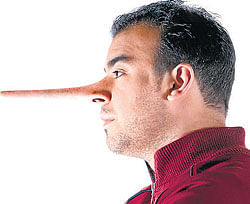
Practice makes a liar perfect! According to a new study, after only 20 minutes of practice, liars can become almost indistinguishable from truth-tellers. The study from Northwestern University found that after training for a short period of time, fibbers can maintain their lies just as easily as their truths when asked about them. Moreover, they became more natural when they speak, slipping up on their truths just as much as their lies.
“After a short time of training, people can be very efficient at lying. The difference between lying and being honest has been eliminated after the training,” said Xioaqing Hu, the study’s co-author.
The study asked 16 people to remember three fake facts about themselves: a new name, a new date of birth and a new hometown.
The volunteers were then asked whether or not a specific fact about them was true, for instance, ‘Is your hometown Detroit?’ Responders would press a ‘yes’ or ‘no’ button in front of them to input their answers.
Researchers then asked a portion of the study, designated ‘liars,’ to press ‘yes’ whenever the fake fact about them came up and ‘no’ whenever the true ones did. Though at first, these subjects had a more difficult time answering, after about 270 trials or 20 minutes, researchers found that they became indistinguishable from truth-tellers based on accuracy and response time. “We think that, psychologically, the people basically learned that this is not me and the fake identity is me,” Hu said.
Researchers said the results of this study help to show that time can help compensate for the brain’s natural instinct to tell the truth.
The reason why lying is so difficult is that it requires an incredible amount of brainpower, since a person must think about contradictory information when telling a lie. Thus, he must suppress the natural desire to the tell the truth.
“Lying is a difficult, because honesty is the default communication mode,” Hu said.
Hu added that once practice has been introduced, people are able to suppress that instinct and so lie much more convincingly.
Hu and his colleagues are now looking to see what kind of effects practising lies will have on people taking polygraph tests. They want to determine whether such machines will be able to identify practised deception or not.
Deccan Herald is on WhatsApp Channels | Join now for Breaking News & Editor's Picks